
The Free Press

I knew this guy in college—soft spoken, smart, kind. He joined the military, and there wasn’t much his Berkeley Hills parents could do about it. And they tried. Desperately.
His choice to enlist wasn’t about 9/11 or Iraq. He didn’t have any fantasies about saving innocent lives or raising the American flag atop Iwo Jima. He didn’t think much about whether the uniform would get girls, or what exciting, exotic places he’d see.
It was something else.
War was just in him. He loved reading about it, loved learning about the weapons and battles. He needed to do this—to kill and risk being killed. And no, he wasn’t a school shooter or an incel; no rage burned within him.
The idea of this person would be mystifying to many of my peers—those of us who grew up in “Free to Be. . . You and Me,” post-draft America. But if you met him, it made sense. There are many such men.
I am not one of them, and perhaps I’m in the majority. The ranks of the un-war-like might even be growing, thanks to the modern, sedentary lifestyle eroding our primordial selves.
But the war-wanters remain, holdovers from a time when we needed them to want it, which is to say almost all of human history.
Of course, it’s good that there is less war today. (There is some debate about whether the world is, in fact, becoming less violent, but there’s no disputing that the number of war-related deaths has plummeted since World War II.) Modern life might be unfulfilling, but the fact remains you’re unlikely to die on a beach separated from your entrails.
Still, the old imperatives remain. We have war within us, whether or not there’s one to wage.
And the NFL gives Americans that war, as spectacle, week after week.
Today, at 6:30 p.m. Eastern time, begins the biggest spectacle of them all: the Super Bowl, where we channel those ancient animal spirits into a highly commercialized event that ends with fireworks and a shiny trophy.
We should celebrate that.
By now, you’ve probably heard all the arguments lodged against the most popular sport in America. There were plenty of them in the aftermath of Buffalo Bills safety Damar Hamlin nearly losing his life after getting body-slammed during a January 2 game with the Cincinnati Bengals. The New York Times, reacting to Hamlin’s on-field cardiac arrest, declared: “We’re All Complicit in the N.F.L.’s Violent Spectacle.” Ryan Clark, the NFL player-turned-ESPN commentator, informed us: “Tonight we got to see a side of football that is extremely ugly, a side of football that no one ever wants to see, and never wants to admit exists.”
Today’s anti-football arguments are more racially freighted than those of the pre-Colin Kaepernick past. After Hamlin’s near-death experience, Scientific American fretted: “The ‘terrifyingly ordinary’ nature of football’s violence disproportionately affects Black men.”
The violence does affect athletes in a “terrifyingly ordinary” way. There have been NFL players, even great ones, who killed themselves. Brain injury, or chronic traumatic encephalopathy (CTE), appears to be an unavoidable risk for players who engage in frequent collisions, especially linebackers. Boston University just released a study showing that 92 percent of NFL players suffer from CTE.
About a decade ago, writers at high-end publications started calling for an end to football. Malcolm Gladwell dubbed it “a moral abomination” and predicted its imminent obsolescence. “This is a sport that is living in the past,” Gladwell said in 2014, “that has no connection to the realities to the game right now and no connection to American society.”
Gladwell was wrong. In 2022, 82 of the top 100 TV shows in America were NFL games, and the top 50 most viewed sporting events were football games or events that immediately followed football games. By contrast, in 2016, only 33 of the top 50 were football-related. The country has lost interest in so much else, but football remains a huge draw and, in fact, is gaining relative market share.
What did Gladwell miss?
He couldn’t see that football violence is an eternal violence. It only seems as if it’s a relic of a less civilized time, because it’s been with us for so long. This inability to see things clearly, I suspect, is more prevalent among the likes of Gladwell, me, and other members of the mainstream media.
The participants themselves, the ones punished by the game, are not so dismissive.

One theme of sportswriter Tyler Dunne’s The Blood and Guts: How Tight Ends Save Football, is that these men accept their fate, painful though it may be. On my podcast, Dunne told me, “I haven’t talked to one football player who has said, ‘I would not do it again,’ when they’re in pain.”
Such players do exist, but they’re unusual. A 2013 Washington Post survey found that, of the nearly 90 percent of retired NFL players who experience daily pain, 91 percent of them attribute it to football—while 93 percent of all retired NFL players report that they are happy they played. In other words, the vast majority of ex-players who suffer from their playing do not regret their football years. The draw of the gridiron is so powerful that its participants consider it a bargain. It is worth experiencing lifelong pain in return for the privilege of playing the sport—however briefly.
Gladwell once asked: “How different are dogfighting and football?” The implication was that the young men of the NFL, hailing from the inner city, were funneled into this game like so many mistreated pit bulls. But if those same men tell us, years after retiring, that they’re happy with the choice they made—well, to consider them victims is to deprive them of their agency.
It should be pointed out that this lends the NFL a great deal of authenticity. By contrast, the NBA, the league I covered for years, is viewed by many as overrun with players uncommitted to their fans, teams and fellow players. This is due to so-called player empowerment, with superstars like Kyrie Irving jumping from one team to another in quick succession, and “load management,” which gives players frequent rests, allowing them to skip games. (This may explain why, in 2017, an average of 20.4 million viewers tuned into the Finals, and in 2022 that figure was 12.4 million—despite a near perfect matchup of Steph Curry’s Warriors against the Boston Celtics.)
Not the NFL. The players’ willingness to get hurt tells viewers they’re for real. Maybe the players are motivated by money, maybe it’s all a pretext to sell beer. Maybe, maybe, maybe—but when you’re out there, between the lines, on that sacred ground, you really could get hurt. People respect that. When Hamlin woke up, the first question he asked was: “Did we win?”
Central to Hamlin’s unbreakable bond with the game, like that of countless other players, is the feeling of brotherhood one experiences on the field—which mimics the same feeling, presumably, one encounters in the foxhole. In basketball, your teammates depend on you, but they don’t depend on you to keep them safe. In football, your mistake can hurt your teammate. You’re not just responsible for yourself. You have a duty to watch your buddy’s back, lest an enemy break it.
In Any Given Sunday, Oliver Stone’s meditation about football’s hold on the American mind, the coach, played by Al Pacino, waxes poetic about what retired quarterbacks miss most about playing football. It wasn’t the girls or the glory.
“You know what he missed?” the coach tells us. “What he missed were those other guys looking back at him in the huddle. Those 11 guys, every one of them, seeing things the same way.”
A commonly heard refrain from athletes.
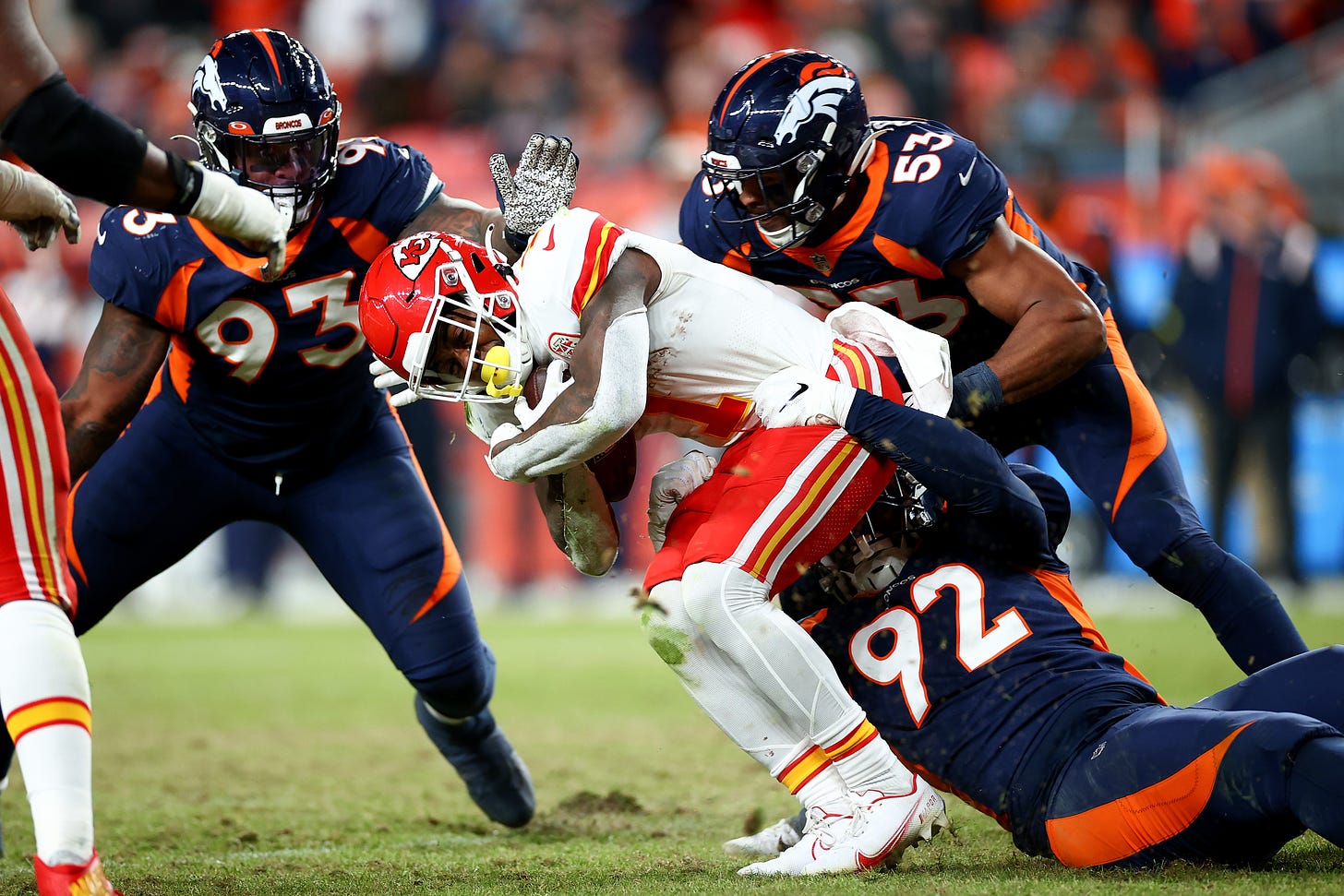
Modernity has given us much, including the alienation and isolation of the daily, digitalized, compartmentalized grind. We feel, more than ever, cut off from other human beings. If I don’t depend on you for survival, then how badly do I need you? And how much do you need me?
We can pine for a new kind of human being who doesn’t crave that ancient, animal spirit. Or we can be happy we have football, its many pitfalls notwithstanding. We can feel reassured that the violence on the field is orderly and, in so far as this is possible, civilized.
Football is that special place where, for three hours or so, we get to peer deeply into the way things used to be—sort of. Of course, we should be overjoyed that most countries no longer fight world wars or wars of religion or massive, bloody civil wars. Nobody sane wants that death. But everyone wants the stakes, the drama, and the bonds that come with that.
This evening, when the Eagles and the Chiefs do battle with each other at State Farm Field, outside Phoenix, people will tune in to watch because—as commercialized and ephemeral as its glories may be—football returns us to the sense of the sacred.
This is Ethan Strauss’ first piece for The Free Press. Follow him on Twitter at @SherwoodStrauss.
And if you love stories that make you think, join our growing community by becoming a subscriber today:

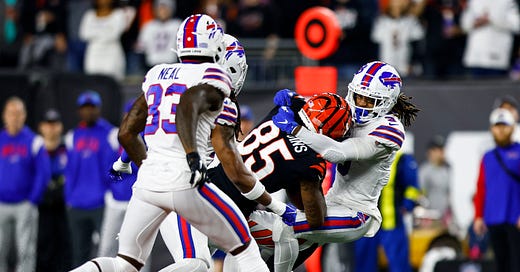

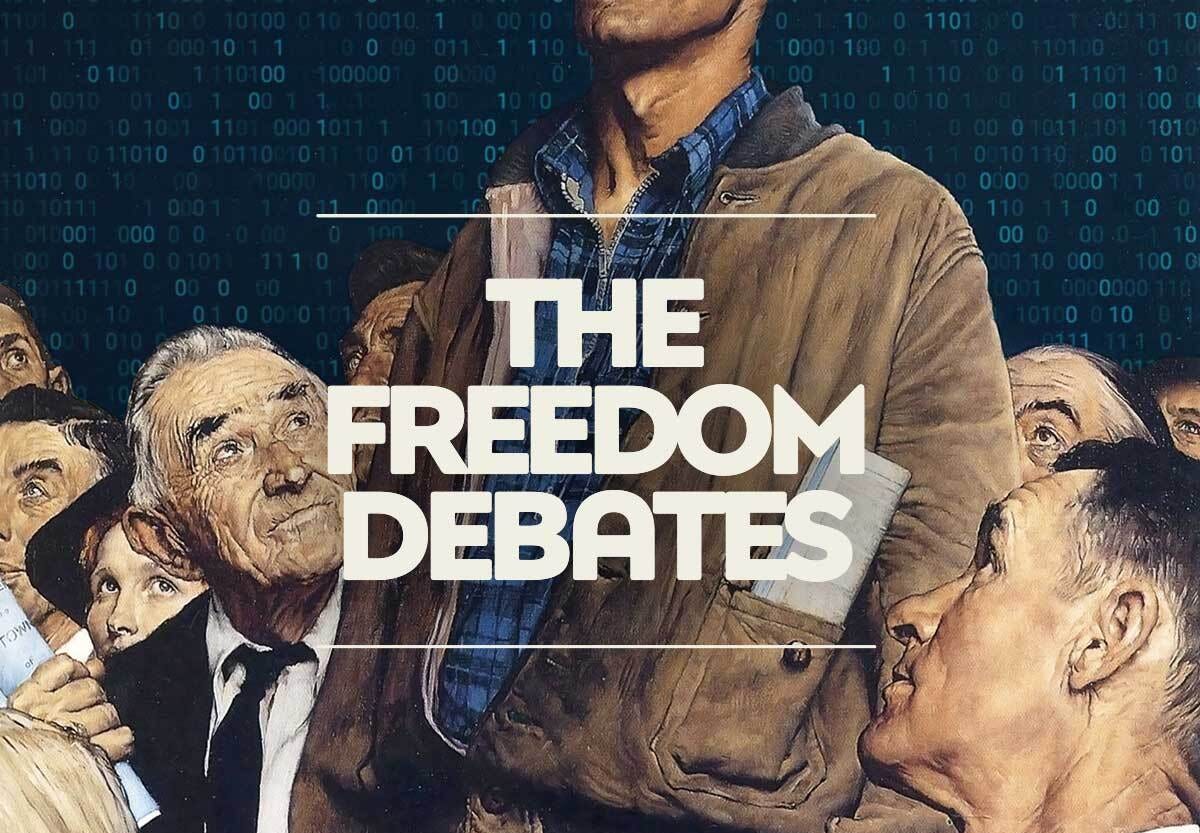

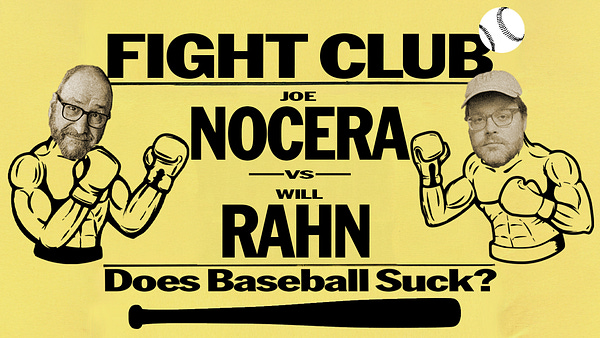

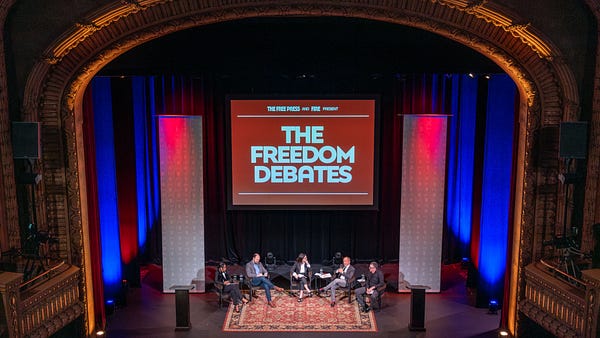



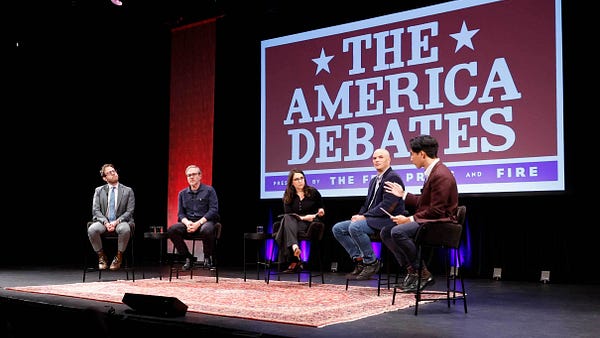

Love this essay so very much. It moved me to write a letter to my son, who will be joining the law enforcement community. I share it here with heartfelt thanks to Ethan Strauss.
Dear (Son),
A few months ago The Free Press published an essay on Why America Needs Football. The author, Ethan Strauss, opens with a story about a guy he knew in college who joined the military immediately after graduation. He was soft-spoken, kind, smart, and “war was just in him.” He loved reading and learning about military history (kinda like you). His parents tried to dissuade him from enlisting (kinda like Mom and me). Later in the essay Strauss quotes Al Pacino’s character from Any Given Sunday, who was reflecting on why retired quarterbacks miss the game.
“What he missed most were those other guys looking back at him in the huddle. Those eleven guys, every one of them, seeing things the same way.”
Strauss sees American football, with all its faults, as a worthwhile national pastime. It speaks to something in our human nature that used to be satisfied by going into battle. He does not believe football glorifies war or violence. “Nobody wants that death. But everyone wants the stakes, the drama, and the bonds that come with that.”
You and I share a passion for music and guitars, and I am very grateful for our affinity. But I have never shared your passion for military history, never understood your desire to serve as a US Marine. It’s always been a mystery to me, but Strauss’s essay exposed some helpful clues. When you were in elementary and middle school, it seemed like all you ever wanted to do was hang out with your friends. It was there that you were happiest. Band of Brothers was a favorite book. How old were you the first time you read it? I wish I had paid closer attention. I might have been more supportive and encouraging. It wasn’t until I took the VFW job that I began to appreciate the unique bond that exists between military comrades. I am sorry that I was so slow to reach this understanding.
Good essays stimulate good reflections. Great essays go one step further and stimulate projections for the future. Like your desire to join the Marines, your desire to serve in law enforcement has baffled me. But I now see it as a natural progression of your passion to serve with other like-minded men and women. It is clear that God wired you for “the stakes, the drama, and the bonds that come with that.” You have an admirable desire to be part of a tribe in which every member sees things the same way and has pledged to watch out for each other. No officer left behind.
Ethan Strauss’s essay won’t make me a football fan. But it helps me understand and appreciate the fans. Also, I didn’t need the essay to make me your fan. I have always been and will always be your Number One Fan. Why America Needs Football opened my eyes to how I can support you as you transition into your chosen career, and how I can encourage and edify you when the inevitable setbacks and obstacles hinder your progress. Your courage and your servant’s heart amaze me. I am so proud of you. Keep doing what you’re doing, (Son). You’re doing good.
Love, Dad
What a great piece, thanks.
One of my most enduring memories from childhood was coming home from a football game played in the pouring rain. I was soaking wet, freezing, covered in mud, my left arm hurt like crazy and barely worked - I loved it - favorite day. We had won, and my arm got better.
I grew up on a military base during the Vietnam War, I married into a Quaker family. For decades it was difficult for my in-laws and I to see each other's worlds. Then they moved to New Zealand, in part to get away from the violence of America. There my mother-in-law fell in love with New Zealand's national sport - rugby. Which I too love. Now we watch all the All Blacks games together, cheering on the violent hits and all.
The fact that an otherwise genteel country like New Zealand loves a game as violent as rugby, and makes the whole idea seem - of course - underscores the thesis of this piece beautifully.